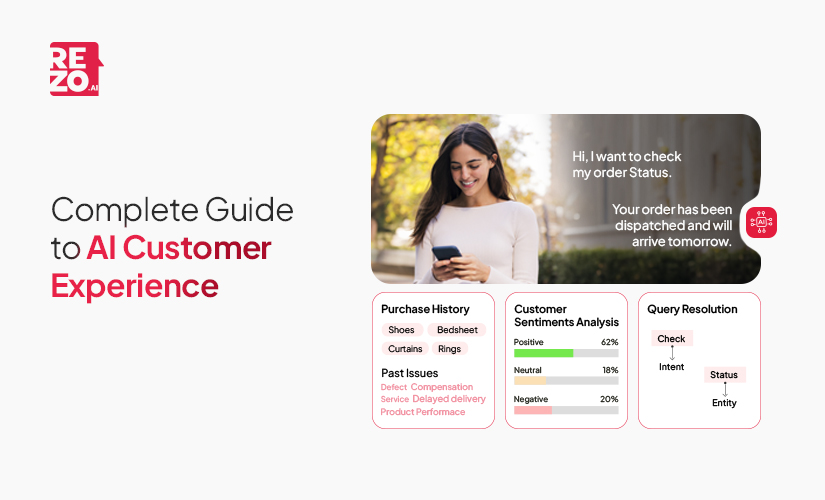
Omnichannel vs Multichannel: Unlocking the Power of Customer Engagement

Omnichannel vs Multichannel: Unlocking the Power of Customer Engagement


Welcome to the ultimate clash between two champions of customer engagement – omnichannel and multichannel marketing. These terms may sound similar, but they represent distinct approaches to creating seamless and unforgettable customer experiences. In this blog, we will embark on a thrilling journey through the realms of omnichannel and multichannel marketing, exploring their definitions, workings, and key differences. Prepare to be captivated as we uncover the secrets to delivering exceptional customer experiences and unleash the full potential of your business.
What is Omnichannel?
Omnichannel marketing is a strategy that focuses on creating a unified and consistent customer experience across multiple channels. It seamlessly integrates various touchpoints such as websites, social media, mobile apps, email, and physical stores, enabling customers to interact with a brand effortlessly. In an omnichannel approach, each channel complements and enhances the others, ensuring a cohesive brand experience at every step of the customer journey.
What is Multichannel?
Multichannel marketing, on the other hand, involves utilizing multiple channels to reach out to customers but without a seamless integration between them. It allows businesses to engage with customers across different platforms simultaneously. However, each channel in a multichannel approach operates independently, focusing on its own goals and strategies. While it offers a broader reach, the challenge lies in maintaining consistency and creating a unified experience across all channels.
How does Omnichannel Marketing Work?
Omnichannel marketing revolves around the idea of delivering a personalized and interconnected customer journey. Here’s how it works:
- Customer-Centric Approach: Omnichannel marketing puts the customer at the center of every interaction. It collects and utilizes data from various touchpoints to gain insights into customer preferences, behaviors, and purchase history.
- Seamless Integration: Omnichannel marketing seamlessly integrates different channels, allowing customers to switch between them without losing continuity. For example, a customer can browse products on a website, receive personalized recommendations via email, and make a purchase through a mobile app.
- Consistent Branding: In omnichannel marketing, maintaining consistency in branding is crucial. The brand’s values, messaging, and visual identity should remain consistent across all channels to reinforce its identity and build trust with customers.
Read More: Omnichannel Customer Experience in Contact Centers
How does Multichannel Marketing Work?
Multichannel marketing focuses on utilizing various channels to maximize reach and engage with a broader audience. Here’s how it operates:
- Channel Diversity: A multichannel marketing approach employs different channels simultaneously to reach customers where they are most active. This could include social media platforms, email marketing, online ads, physical stores, and more.
- Independent Channel Strategies: Each channel in a multichannel approach can have its own specific strategies and tactics. For example, social media marketing may focus on building brand awareness, while email marketing targets customer retention and upselling.
- Silos of Communication: In a multichannel strategy, there may not be seamless integration or data-sharing between channels. Customer interactions are treated as separate touchpoints rather than part of a holistic journey. Omnichannel vs Multichannel – Key Differences

While both omnichannel and multichannel marketing aim to engage customers across multiple channels, there are significant differences between the two:
- Integration vs. Independence: Omnichannel marketing seeks to integrate channels for a seamless customer experience, while multichannel marketing operates with independent channels that may not be interconnected.
- Consistency vs. Diversity: Omnichannel marketing emphasizes consistent branding and messaging across all touchpoints, whereas multichannel marketing allows for more diverse strategies across different channels.
- Customer Journey vs. Touchpoints: Omnichannel strategy focuses on creating a unified customer journey, whereas multichannel marketing emphasizes individual touchpoints.
Omnichannel Marketing Examples
To illustrate the power of omnichannel marketing, let’s explore a couple of inspiring omnichannel marketing examples:
- Starbucks: Starbucks offers a seamless omnichannel experience through its mobile app. Customers can order and pay for their drinks in advance, earn rewards, and customize their orders, all from their smartphones. The app integrates with in-store systems, allowing customers to pick up their orders quickly and conveniently.
- Nike: Nike provides an interconnected experience by integrating its online and offline channels. For instance, customers can use the Nike+ app to discover and learn about new products, scan barcodes in-store for more information, and seamlessly make purchases online or in-store.
Multichannel Marketing Examples
While multichannel marketing may not provide the same level of integration, it still offers opportunities for effective customer engagement. Here are a couple of multichannel marketing examples:
- ASOS: ASOS leverages various channels, including its website, mobile app, social media, and email marketing, to engage its target audience. By consistently reaching out to customers across these channels, ASOS maximizes its brand exposure and drives sales.
- Amazon: Amazon is a prime example of successful multichannel marketing. The e-commerce giant utilizes its website, mobile app, email campaigns, and online ads to engage customers and provide a seamless shopping experience across multiple touchpoints.
How to Provide an Omnichannel Customer Experience?
Rezo.ai offers a comprehensive solution to help brands provide an exceptional omnichannel customer experience. With its Engage AI and Analyse AI capabilities, Rezo.ai enables brands to automate customer interactions, personalize messaging, and gain valuable insights to enhance engagement:
Engage AI leverages virtual agents and deep LLM interactions to automate customer interactions across channels, ensuring a consistent and personalized experience. It features smart contact strategies, dynamic scripts, and multilingual bots to maximize engagement and lead generation. Rezo.ai’s Engage AI also provides insightful dashboards to monitor campaigns in real-time and define success metrics.
Analyse AI, on the other hand, extracts value from agent-customer interactions by providing accurate speech-to-text capabilities, automated tagging, and SOP audits. This helps brands analyze the health of their contact centers, uncover Voice of Customer insights, and boost agent productivity. The insightful dashboards provided by Analyse AI empower brands with real-time intelligence and the ability to define success metrics.
Overall, Rezo.ai’s Engage AI and Analyse AI solutions empower brands to deliver seamless omnichannel experiences, improve customer engagement, and make data-driven decisions to optimize customer interactions.
In the battle between omnichannel and multichannel marketing, both approaches have their merits. Omnichannel marketing offers a more integrated and consistent experience, focusing on the customer journey, while multichannel marketing maximizes reach and engages customers across diverse platforms. Ultimately, the choice depends on your business goals and target audience.
To succeed in today’s competitive landscape, it’s crucial to understand the differences between omnichannel and multichannel marketing and leverage their strengths intelligently. By combining seamless integration, consistent branding, and customer-centric strategies, you can unlock the true potential of customer engagement and propel your business towards unprecedented success.
In the dynamic world of customer engagement, understanding the nuances of omnichannel and multichannel marketing is the key to driving your business forward. By identifying the strengths of each approach and implementing strategies that resonate with your target audience, you can unlock the immense potential of customer engagement and revolutionize your business. So, embrace the power of omnichannel and multichannel marketing, and prepare to embark on a remarkable journey towards customer-centric success.
FAQs on Omnichannel vs Multichannel
Frequently Asked Questions (FAQs)

Take the leap towards innovation with Rezo.ai
Get started now














